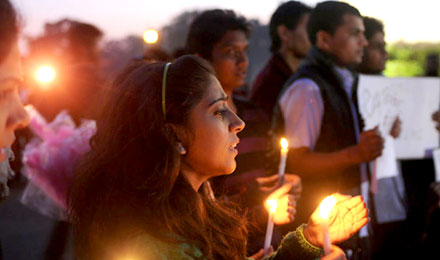
New Delhi, Feb 2: Over a month after the brutal gangrape and murder of a 23-year-old paramedical student in Delhi, five accused have been charged under 13 sections of the Indian Penal Code. The charges framed against the accused include gangrape, murder and destruction of evidence.
The accused have been charged with murder, gangrape, destruction of evidence, criminal conspiracy, dacoity, unnatural sex and common intent. The trial will formally begin on February 5.
Section 365 - Kidnapping or abducting with intent secretly and wrongfully to confine person
Section 376(2)g - Gangrape
Section 377 - Unnatural sex
Section 307 - Attempt to murder
Section 394 - Voluntarily causing hurt in committing robber
Section 395 - punishment for dacoity
Section 396 - Dacoity with murder
Section 397 - Robbery or dacoity with serious weapon causing severe injury
Section 412 - Dishonestly receiving property stolen
Section 201 - Destruction of evidence
Section 120B - Criminal conspiracy
Section 34 - Common intent
Section 302 - Murder
Meanwhile, the sixth accused in the case has been declared a minor by the Juveline Justice Board and he will now be tried under the Juvenile Justice laws.
The family of Delhi braveheart has also sought an appointment with UPA chairperson Sonia Gandhi to apprise her of their woes and demands. The father of the girl told PTI on phone that he has sought an appointment with Gandhi.
Her office has asked the family to wait for some time in keeping with her pressing commitments, he said. The family is unhappy over the Juvenile Justice Board's decision on the sixth accused, but have full faith that despite him being ruled as a minor, he would also get sternest of punishments, he said.
The father of the girl said he was seeking advice of legal experts on the decision of the Juvenile Justice Board but was yet to decide whether to go to court in this connection. The family would try to ensure that the court takes this act as an exception and pronounce sternest of punishments to the accused. Her father said he found himself helpless before the law.
The Juvenile Justice Board had said the sixth accused, described as the most brutal by the Delhi Police in its charge sheet, was a "minor" and this could enable him to walk free by June 4 this year when he attains the age of 18 years.
The brother of the deceased said just as the central and Delhi governments initiated steps on rape cases following mass protests and agitations, there should also be efforts for awarding capital punishment for minor offenders in rape cases. He also took exception to media running news of his sister's love affair.






Comments
Add new comment